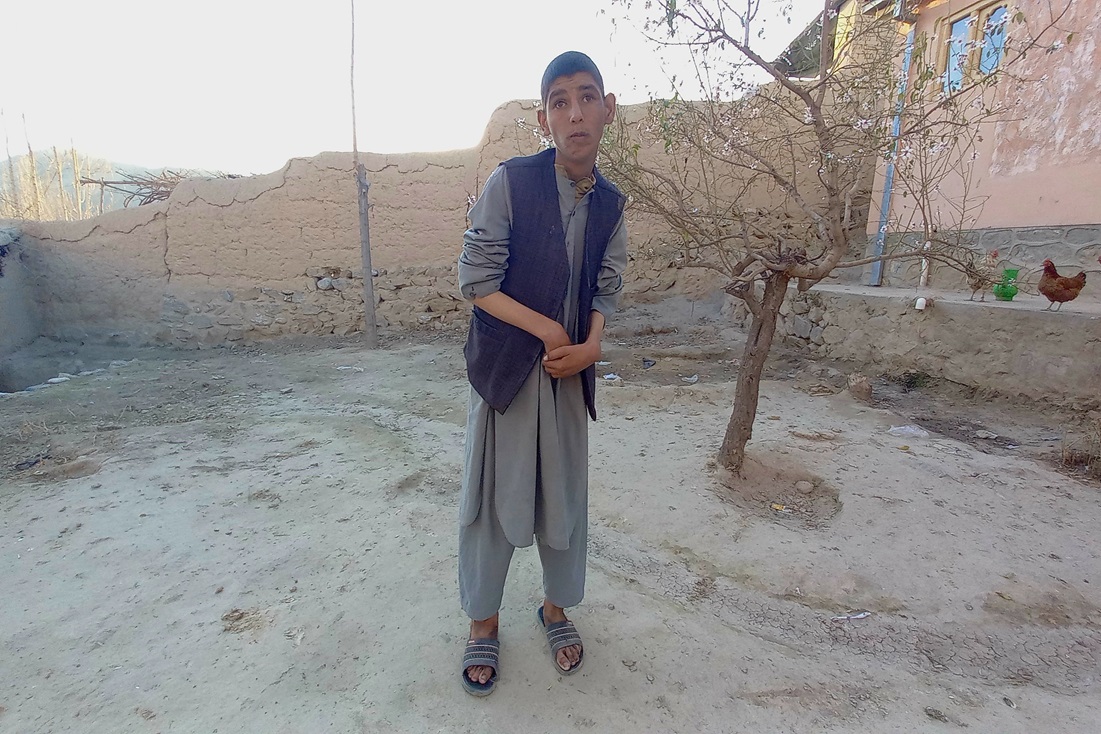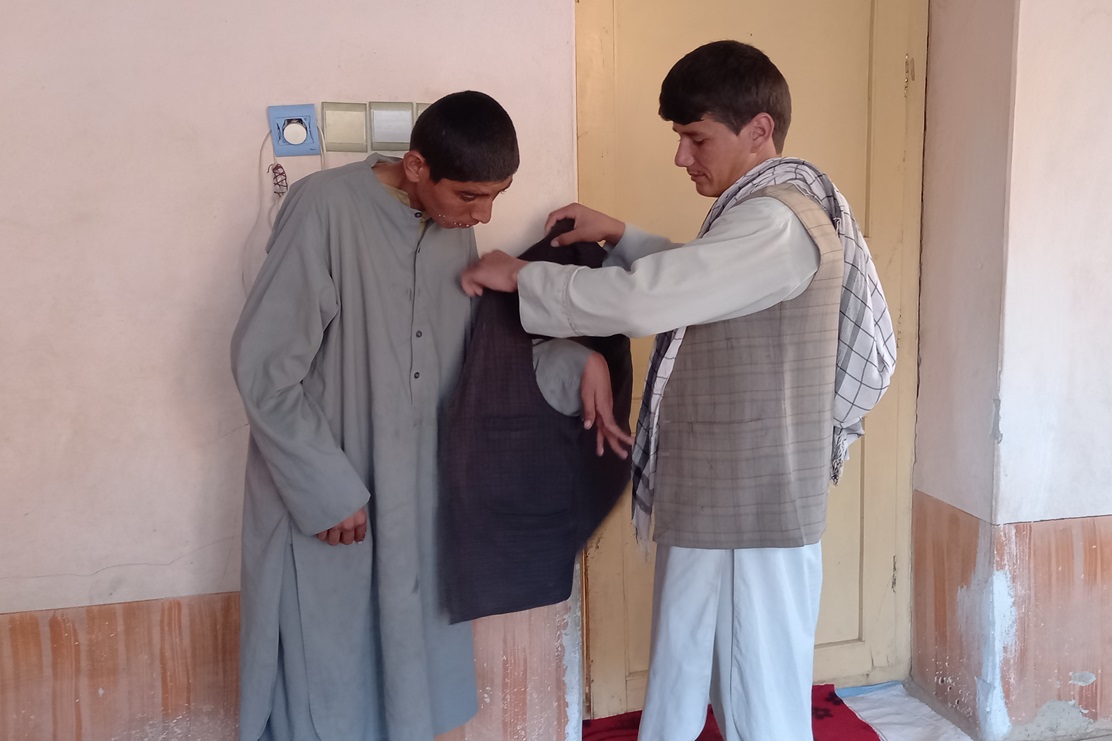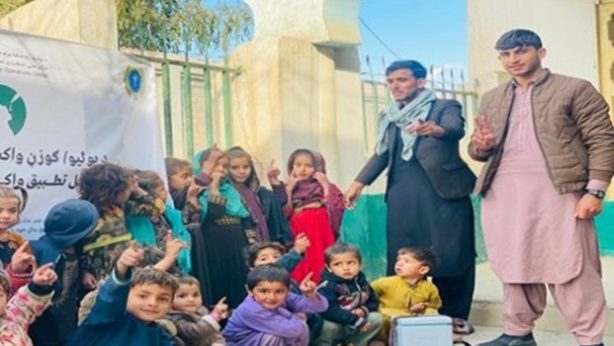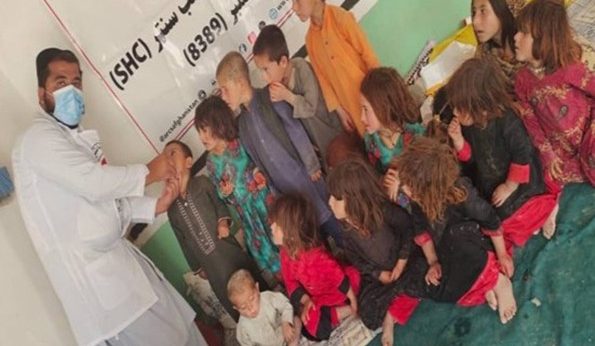Mukhtar: Polio has thwarted my dreams of becoming a volleyball player

Raqiba Hamidi
Badakhshan, Afghanistan – 18-year-old Mukhtar contracted polio at the tender age of four. Regrettably, this disease left his left arm and leg paralyzed.
He originally hails from Baid Chineh village, located in the heart of Faizabad city in Badakhshan province. However, for the past five years, he has been residing in the Television Tepah area, enduring a challenging life with his two brothers, sister, and mother.
Mukhtar, due to the effects of polio, is unable to engage in any physical activities. His 16-year-old brother, Bahram, shoulders the responsibility of providing for the family by gathering sand from the Kokcha River. Meanwhile, Kamil, their 10-year-old brother, focuses on his education, and their 13-year-old sister Marwa assists with household chores.
The economic situation of the mentioned family is precarious. This is primarily because Mukhtar’s father remarried about ten years ago and separated from them, leaving Bahram to shoulder the responsibility of providing for the family.
 18 years old Mukhtar contracted polio at the tender age of four. Regrettably, this disease left his left arm and leg paralyzed. © Polio-free Afghanistan/ 2024/ Raqiba Hamidi
18 years old Mukhtar contracted polio at the tender age of four. Regrettably, this disease left his left arm and leg paralyzed. © Polio-free Afghanistan/ 2024/ Raqiba Hamidi
Mukhtar desired to pursue education and become a volleyball player. However, his dreams were shattered when he became disabled due to polio, leaving his wish unfulfilled.
“When I was a child, our family lived in a remote and underdeveloped area. My mother was occupied with farming and tending to animals. Unfortunately, there was no health center in our village, and I cannot recall whether there were polio vaccination campaigns at that time or not. However, my mother was unable to vaccinate me due to the demands of household chores, poor road conditions, and the distance to a health center. As a result, I contracted polio,” he stated
He expresses that when he witnesses his peers graduating from school, leading independent lives without relying on others for transportation, food, and other essential needs, he experiences profound disappointment because he yearns to have a healthy life like theirs.
With a whispering voice, he added, “Until the age of 12, I clung to the hope that when I grew up, I would acquire wealth, heal myself, and regain my health. However, as time passed, I came to the painful realization that there is no cure for my disability. I will continue to be a burden to my family and community for the rest of my life.”
Mukhtar explains that his profound passion for volleyball drove him to travel 10 kilometers from his house to the volleyball court, despite his disability, just to watch the game.
He recounted, “In this regard, I collided with a car one day on the road, breaking my right hand. when other children saw my condition, they hastily fled, whispering, ‘Look, he is crazy.’ Some mockingly questioned, ‘You can’t even eat your food, what do you want from volleyball?’ The weight of those hurtful words became unbearable, and since then, I have never set foot on the field of my dreams.”
He wishes that during his childhood, the volunteers of the polio vaccination campaign had gone door-to-door and administered the vaccine to him.
But he also mentioned that unfortunately, there are still families who do not take advantage of this opportunity and choose not to vaccinate their children.
 Mukhtar’s younger brother, Bahram, shares that each day, when he returns home exhausted from work and sees his elder brother Mukhtar in a helpless state, he experiences profound sorrow and agony © Polio-free Afghanistan/ 2024/ Raqiba Hamidi
Mukhtar’s younger brother, Bahram, shares that each day, when he returns home exhausted from work and sees his elder brother Mukhtar in a helpless state, he experiences profound sorrow and agony © Polio-free Afghanistan/ 2024/ Raqiba Hamidi
In a heartfelt message to families, he emphasizes, “I wasn’t vaccinated during my childhood, and now I am disabled. Polio is a dangerous and life-threatening disease. Please ensure the vaccination of your children before they face the risk of becoming disabled like me, thereby safeguarding them from this perilous disease.”
Mukhtar’s mother, 45 years old Nadira, also asserts that her son contracted polio because he was not vaccinated.
She said, “When my son was four years old, he first developed a fever, followed by diarrhea. Our financial situation was challenging, so I couldn’t take him to the doctor immediately. Three days later, I noticed that his left side was numb. A week after that, I borrowed money from my neighbor and took him to the doctor. Unfortunately, after the examination, the doctor informed me that my son was infected with polio, a disease that, sadly, has no cure.”
She explained that her son is suffering from polio, which has left him severely disabled. Adding to their hardships, the father left them after his second marriage, leaving her to take care of their children’s well-being on her own.
She states that mothers today are fortunate to have access to the polio vaccine, allowing them to easily vaccinate their children against polio.
Mukhtar’s younger brother, Bahram, shares that each day, when he returns home exhausted from work and sees his elder brother Mukhtar in a helpless state, he experiences profound sorrow and agony.
He said that he had hoped Mukhtar would become the breadwinner of the household after their father, but disability not only shattered his hopes but also those of all the family members.
Momina Khairkhah, a social activist from Badakhshan, asserts that individuals disabled by polio in this province are facing serious challenges and are often overlooked.
She emphasizes that if we want our children to have a healthy future, we must ensure they are vaccinated regularly. She warns that if even a single child is left unvaccinated due to our negligence, it could expose the entire community’s children to the threat of polio.


